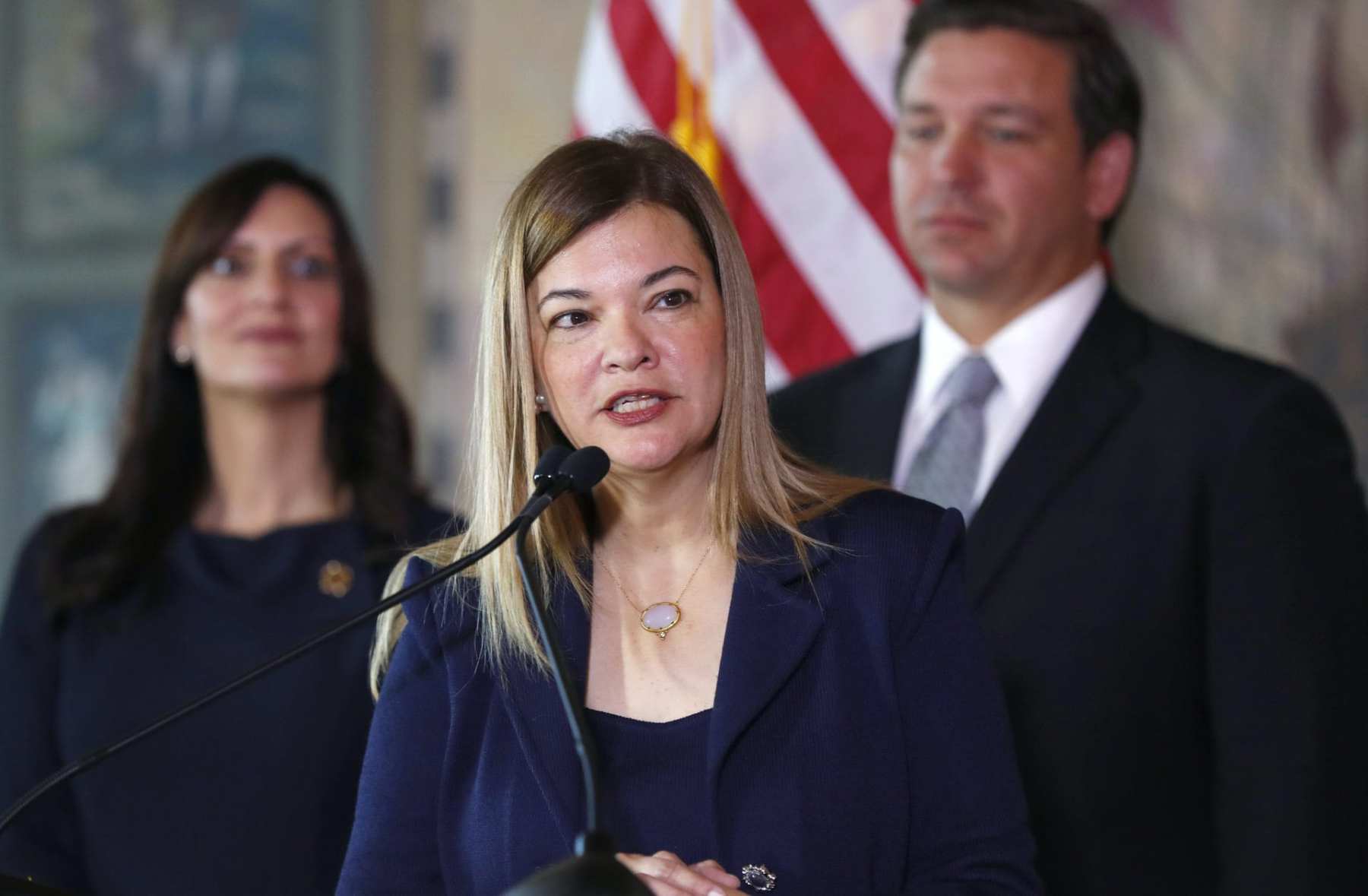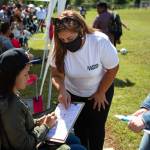As President Donald Trump weighs his choices for a potential nominee to replace the late Justice Ruth Bader Ginsburg on the Supreme Court, one question is surely on his mind: Can picking Barbara Lagoa, a Cuban-American judge from Miami help him win the key battleground state of Florida?
Lagoa, a former Florida Supreme Court justice and, more recently, a judge in the 11th Circuit Court of Appeals, has risen to the top of the president’s shortlist, which includes at least five top female contenders. Although Trump said earlier this week that he doesn’t personally know Lagoa, she has significant support, particularly from Republican politicians in Florida who hope she will sway voters if Trump chooses her as his nominee.
The president is expected to announce his selection on Saturday, after visiting Miami on Friday.
“It’s a play for women voters, Hispanic voters, Cuban voters and most importantly, an acknowledgement of the necessity to make sure Florida’s 29 electoral votes stay in the Trump side,” said Fernand Amandi, a Miami-based pollster and Democratic strategist.
Florida has long been a battleground state that can make or break a presidential election. In 2016, Trump won the state; in 2008 and 2012, it went to former President Barack Obama. Current polls have Biden and Trump in a dead heat, within the margin of error.
The state breaks down like this: South Florida is largely Democratic, including the state’s most populous county, Miami-Dade, which is also home to Florida’s influential and reliably Republican Cuban-American population. North Florida and the panhandle skew Republican. Central Florida, particularly the Interstate 4 corridor, is a toss up — it’s home to a large retirement community called the Villages that leans Republican, but also home to a growing Puerto Rican population that leans Democratic.
In the Latinx community, men are far more likely to support the president than Latinas, who are largely anti-Trump. Research by Equis, a Democratic Latinx firm that has conducted nearly 30,000 interviews with Latinx voters in 11 states, found an 11-point gender gap in the approval rating for Trump in Florida, with more Latinos supporting the president than Latinas.
The problem with Latinas is turnout. Women in the Hispanic community go to the polls at 14 to 20 percent lower rates than White women and Black women.
If the president chooses Lagoa, the Trump campaign will no doubt be betting that she can encourage women to turn out — and vote Republican.
There’s also another calculus to keep in mind: The Latinx vote is complex, shaped by country of origin, immigration status, years in the United States and other factors.
Cuban-Americans by and large support the Republican party and the president, though there’s a gender gap there, too, with men being the more active voters. That support is entrenched in the idea that Democrats embrace socialist policies — the same ones that they fled in their home countries. Other Latinx people, including Mexican-Americans and Puerto Ricans, tend to support Democrats.
Lagoa, who is less known than another woman at the top of Trump’s list, Amy Coney Barrett, a judge on the U.S. Court of Appeals for the 7th Circuit, is less likely to draw name recognition. But the symbolic choice of placing a Cuban-American woman on the nation’s highest court could drum up support — much like Obama’s appointment of Sonia Sotamayor in 2009 was a first for Puerto Ricans.
“The idea that there will be the second Hispanic woman on the Supreme Court, I think may, on the margins, potentially move a couple of points,” Amandi said. “And in a state like Florida, that’s potentially a decisive number.”
But who, exactly, would be inspired to vote by her nomination is important, said A.J. Delgado, a Cuban-American who served as senior adviser to the Trump campaign in 2016 and played a major role in the president’s Latinx outreach in Florida. Delgado now supports Biden.
There are already tensions within Latinx subgroups, Delgado said, questions of whether Cubans understand the immigration issues of other Latinx people and whether their own struggles with communism are fully appreciated by other immigrants.
“It sounds ridiculously obtuse and downright ignorant for anyone to say that a White wealthy Cuban-American Republican from Miami is going to do a single thing, or move the needle one iota, to help you get the vote of a Puerto Rican in Orlando or a Mexican-American in Arizona,” Delgado said. “If anything it might even push their vote away because it’s once again the Republican Party saying, ‘the Latinos that we consider acceptable are Cubans.’”
Delgado also questions how much the appointment of a Supreme Court judge would matter to Latinas who are on the fence.
Discussion of the possibility of Lagoa’s appointment hasn’t yet swayed Dayana Sanjurjo, a Cuban-American in Miami who is undecided about who she will vote for in November. It would be an important milestone if a Cuban-American woman is confirmed to the Supreme Court, she said, but it’s not a deciding factor for her.
“I don’t think that should be the deciding factor for anybody,” said Sanjurjo, 37. “If your vote falls on that, then I think you have it all wrong.”
But it might sway women who were already starting to lean toward the Trump camp, like 31-year-old Indira González, a Cuban-American who immigrated to the United States when she was 16.
“It’s an addition that solidifies my decision to go Republican,” said González, who added that she sees herself represented in Lagoa, whose parents came to this country fleeing Fidel Castro, and who worked hard to achieve her goals. Lagoa, a mother of three daughters, earned her law degree from Columbia Law School and was on the team of attorneys representing the Miami family of Elián González, a 5-year-old Cuban refugee who was rescued near Florida after his mother drowned in an attempt to flee Cuba.
Indira González (no relation to Elián) is a mother of two daughters, ages 3 and 5, and is working toward her master’s degree in accounting while working at Florida International University in Miami, where Lagoa got her bachelor’s degree in 1989.
She said her student loans were the one thing that stopped her from immediately voting Republican, like the rest of her family. (Polling shows that Trump’s record on the economy is a strong driving force behind the Cuban vote, in particular.) But ultimately, it was her belief that Democrats are more socialist that swayed her.
“What I’m looking at right now is that the Democrats are being too left for my liking,” she said. “I left Cuba for a reason.”
A Lagoa nomination is certainly not going to push women like Giezi Tobar, who already supported the president, but it does embolden her.
The Democrats acknowledged Black women when they put Kamala Harris on the ticket; this could be a moment to recognize the strides Cuban-American women have made, said Tobar, 53.
She left Cuba in the late 1960s as a 27-day-old baby with her twin sister and her parents, who were fleeing the Castro regime after it tortured and murdered her uncle. Her politics are centered on a strong Cuban upbringing, she said. She doesn’t support the way the president talks — “he’s arrogant” — but she believes his message aligns more with core American principles.
Still, she doesn’t think Trump is considering Lagoa just to get the Cuban vote.
“I think, for the most part — I may be only speaking from my little world — the Cuban vote is solid for Trump,” Tobar said.
Delgado, the former Trump adviser, said the decision to nominate a woman is at odds with the Republican Party’s assertion that it doesn’t play identity politics and doesn’t support affirmative action. Lagoa, 52, also doesn’t have the traditional resume of a Supreme Court judge, lacking extensive experience at the federal level. She served 13 years as a state court judge before her appointment to the Atlanta-based Court of Appeals for the 11th Circuit in December.
“They want to go with a woman — they think this will help them,” Delgado said. “Trump knows he’s behind on suburban women.”
Trump is trailing Biden by double digits in the polls among women voters.
Regardless, the elevation of Lagoa should also be a wake-up-call for Biden’s camp that capturing the Latinx vote in any way could be decisive, Amandi said.
In Florida, field organizers for Biden have complained of a disorganized campaign, particularly in Central Florida. In recent weeks, the former vice president was in Kissimmee, a Puerto Rican stronghold in Central Florida, while Harris traveled to Doral near Miami, a Venezuelan enclave.
“It’s clear that they seem to have gotten the message from what the polling indicated and they are now, in the eleventh hour, frantically trying to make up any potential ground they may have lost,” Amandi said. “The problem for Biden is he can’t really afford to leave any Hispanic votes on the table.”





